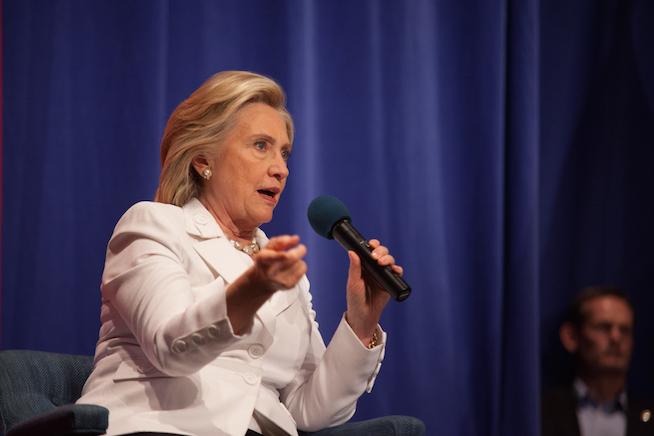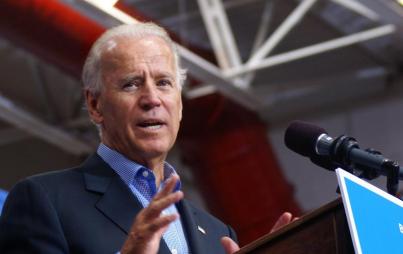
This lady wants you to go to college for free.
Bush’s homepage currently features the story of meeting his wife, a charming love-at-first-sight narrative in first person. As far as actual policy info, Bush’s website does not have anything on how he would address economic issues confronting millennials.
Last week, I wrote about why millennials face serious financial hurdles to independence. Today, I’m looking for 2016 POTUS candidates to throw us an economic-policy bone.
Here’s what little can be garnered from the top players’ campaign websites:
Hillary Clinton
Free college? For reals? Yes. Clinton announced her plan at a recent speech in Exeter, NH. The details include some student contribution, in some cases, and free tuition only applies at public universities and community colleges. But overall, this mode of higher-ed funding would be a monumental shift from status-quo payment, which has traditionally fallen solely on the student herself.
Detractors argue that taxpayers will foot the bill, which Clinton doesn’t deny, and they point out that the main beneficiaries of a college degree are . . . the degree holders. So should millions of Americans who never attended college or who never will attend college be made to pay for Max’s degree in Art History?
The debate about how to lower college costs remains up in the air. But a solution to the growing student debt crisis cannot come quickly enough. Kudos to Ms. Clinton for offering us something.
Donald Trump
Trump has but one position statement on his website, and it is on immigration. He thinks we should deport all illegal immigrants (an estimated 11 million people). So there might be some careers opening up in the transportation industry. (I kid, I kid.)
Trump does talk a lot about jobs, which may find some resonance with millennials. His otherwise absurd and offensive rhetoric will likely demolish that support (one imagines, at least).
Bernie Sanders
Bernie Sanders has a long list of positions on a whole host of issues, including jobs and income inequality. While these issues don't speak directly to millennials, they do address the job and wage deficit by proposing higher taxes on the wealthy, raising the minimum wage, and ensuring companies cannot outsource jobs.
Economists argue over the effectiveness of these tactics, and trying to define a Democratic-Socialist (as Sanders identifies himself) has yielded some humorous results. But Sanders gets at least some hand-claps for providing a detailed vision . . .
Jeb Bush
Bush’s homepage currently features the story of meeting his wife, a charming love-at-first-sight narrative in first person.
As far as actual policy info, Bush’s website does not have anything on how he would address economic issues confronting millennials . . . his main page has no link to economic policy whatsoever. Bush’s focus appears to be foreign policy, military veterans, K-12 education reform, and endorsements.
Ben Carson
With no previous political background, Ben Carson advertises himself as the innovative conservative voice for Republicans. His main page does advocate for a Balanced Budget Amendment, and he proposes a full overhaul of the current tax code.
This is good news, as the US ranks 32nd out of the 34 OECD (Organization for Economic Cooperation and Development) in measuring the fairness and competitiveness of its tax code. Real world translation: it shouldn’t take a small village of lawyers to make sense of your W2.
Marco Rubio
Rubio’s slogan is "The New American Century," and he dubs his approach to jobs "The New American Economy." Embracing technological advancements — often referred to as “disruptions” — is Rubio’s plan for improving the country’s employment numbers.
There’s much at stake here. (Witness the current battles between taxi unions and Uber, the traditional hotel lobby and Airbnb). And while there are reasons to be wary of disruption for disruption’s sake (The Internet is Not the Answer by Andrew Keen makes a strong case), this new entrepreneurial, contract-based economy will likely make a lot of sense to millennials.
Ted Cruz
The Texas senator announced his run at Liberty University, so he clearly feels some affinity with a certain slice of Evangelical millennials. His homepage currently features several stories on supporting religious liberty — further proof he’s focused on that constituency.
His stance on jobs and the economy reads like a Tea Party pipe dream. Cruz is all about deregulating just about everything, and making sure the government in general, and the EPA in particular, are cut, cut, cut.
Scott Walker
Walker’s campaign appears preoccupied with beefing up his foreign policy credentials. Featured stories include words like China, Ukraine, fighting and winning. Etc. One suspects that a Walker presidency would include union demolition, as doing just that in Wisconsin is what propelled Governor Walker to national stardom. It seems unlikely that such a limited economic vision will appeal to millennials.
Carly Fiorina
After rocking the Fox News conciliation debate back on August 6th, Fiorina is now at #7 in RealClearPolitics average of GOP candidate polls. Not bad for someone who as recently as June had less than 1% of voter support.
Fiorina’s claim to fame is her former position as CEO of HP. More than any other candidate, Fiorina gets the tech world, and as the sole female GOP candidate, gets mega smiling emojis for giving us that sweet piece of irony — Fortune published this disheartening data on employment numbers: Facebook (69% male, 31% female), Google (70% male, 30% female), Twitter (70% male, 30% female).
Alas, Fiorina’s website offers video answers to various questions, but no quick and easy links to straightforward policy. We figure she understands the economy, given her business background, but what that means for Millennials? We’ll have to wait and see.
John Kasich
Like Fiorina, the first GOP debate was a boon to Kasich’s campaign. Starting out with 1.2% support, Kasich now has 4.5%.
People seem to like him for his positive, compassionate outlook, something in rare supply in any political realm, but particularly the current one. His website doesn’t offer much in the way of millennial outreach. Kasich did help balance the budget while in Congress, and he has a decent record as Governor of Ohio in creating jobs and cutting taxes. But . . .
Like most candidates here, there’s just not much for us millennials.
The Republican list of candidates is too long to give a recap of everyone, but whether millennials will overlook their collective conservative stance on issues like gay marriage and abortion remains to be seen. This writer doubts it, but a lot will depend on what changes occur, internationally and domestically, between now and November 2016.
Stay tuned.







